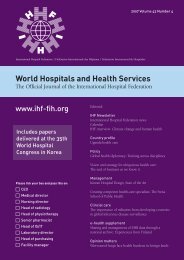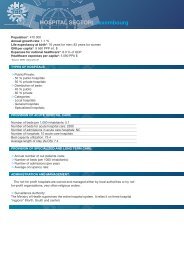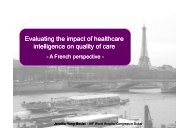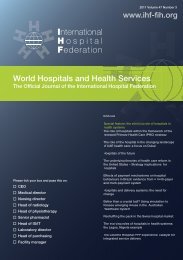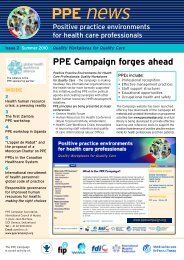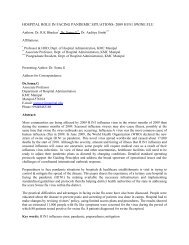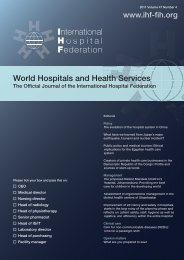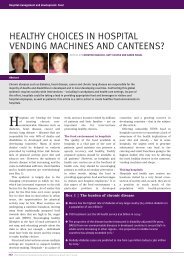Full document - International Hospital Federation
Full document - International Hospital Federation
Full document - International Hospital Federation
You also want an ePaper? Increase the reach of your titles
YUMPU automatically turns print PDFs into web optimized ePapers that Google loves.
Innovations and clinical specialities: oncology<br />
subsequent to the Darwin forum, and the project funded by<br />
TCCWA, of which this scan is a component, exemplifies the<br />
interest in how Indigenous cancer control might be progressed. An<br />
intensive week of training with ongoing opportunities for<br />
networking and relevant professional development seems a<br />
particularly useful approach to increasing Indigenous capacity<br />
around cancer issues. Activities and projects catalysed by small<br />
seed project funding and initiated regionally or locally within<br />
established networks, were often cited as successes. However,<br />
such successes had not generally been translated into sustained<br />
activity or programmes. Participants consistently recognised the<br />
importance of long-term and well planned programmes with<br />
dedicated resources. Practitioners involved in health promotion<br />
with Indigenous clients advocated the use of “nonpreachy”<br />
methods, that is, approaches that appeal to an individual’s<br />
concern for the health and wellbeing of their family and the<br />
community rather than harms to their own health. Thus, messages<br />
around tobacco control might focus initially upon harm reduction<br />
by preventing passive exposure of family members to tobacco<br />
smoke.<br />
Cancer Councils provide support services for people with<br />
cancer that recognise the social, spiritual, emotional, and physical<br />
supports of cancer patients and their family members. However,<br />
most were aware of their own organisational limitations in<br />
understanding and capacity, particularly around Indigenous culture<br />
and values. Although there has been very limited exploration in<br />
Australia of what cancer means to Indigenous Australians, those<br />
interviewed recognised that Western psychosocial and support<br />
models might not be appropriate for Indigenous clients. This deficit<br />
in understanding made service providers feel that they lacked the<br />
knowledge and confidence in supporting Indigenous clients well.<br />
Staffs were keen to better appreciate Indigenous people’s sociocultural<br />
understanding of cancer and to use this knowledge in their<br />
practice in cancer service delivery. Many would welcome<br />
Indigenous cultural awareness training but wanted specific<br />
information around cancer beliefs, not just information about the<br />
historical context of Indigenous health. Although Cancer Councils<br />
have a well developed network of volunteers to help support<br />
people with cancer, training of existing staff and volunteers to<br />
support Indigenous people is needed. It may be helpful to provide<br />
Indigenous mentors for non-Indigenous staff who are<br />
inexperienced in working with Indigenous people. Recruitment<br />
and support for Indigenous volunteers and cancer survivors to<br />
assist in cancer advocacy work is in place in SA and Queensland,<br />
but not in other jurisdictions. One-to-one support services appear<br />
to be underutilised currently, and Indigenous-specific cancer<br />
survivor support resources using testimonials or story-telling may<br />
be helpful. An issue regularly raised within Indigenous cancer<br />
contexts was the use of traditional healers and traditional<br />
medicines, 22 although these issues were generally not mentioned<br />
by the informants interviewed. Support programmes that integrate<br />
cultural components (traditional medicine, selected ceremonies)<br />
may be acceptable and effective means of supporting Indigenous<br />
people to engage in cancer treatment.<br />
There are many similarities between the cancer issues<br />
experienced by Indigenous Australians and those of indigenous<br />
people in other developed countries. It is beyond the scope of this<br />
paper to discuss in detail the experience in cancer control and<br />
support strategies in indigenous populations in countries such as<br />
Canada, New Zealand and the United States. However, the<br />
authors have undertaken a comprehensive literature review of<br />
these populations and key lessons from international experience<br />
are: acknowledgement of past treatment and the impact of<br />
colonisation; acknowledgement of the cultural diversity of<br />
Aboriginal people; recognition of the impact of the structural<br />
causes of inequality; need to enable Indigenous ownership,<br />
participation, partnership and control, with Indigenous<br />
representation at all levels of decision making; and support for<br />
community-based and community-driven interventions. There<br />
have also been efforts to develop culturally appropriate resources<br />
and servicebased programmes, promoting Indigenous healing<br />
approaches concurrently with Western medical treatment. The<br />
reader is recommended to read further about these<br />
approaches 23,28 which were generally Indigenous community-led<br />
and government supported.<br />
While there has been a lack of Australian government leadership<br />
in this area, Cancer Councils can play both an effective practical<br />
and advocacy role at the local, state and national level to ensure<br />
Indigenous issues in cancer control are more effectively<br />
incorporated and heeded. Respondents recognised that this<br />
should be done “hand-in-hand in partnership with Indigenous<br />
communities”, and leadership is needed from The Cancer Council<br />
Australia to ensure that there is steady national progress with<br />
lessons shared across jurisdictions. The need for Cancer Councils<br />
to adopt a respectful approach that invests in learning and<br />
understanding about Indigenous issues, and the reciprocal<br />
benefits that might derive from such partnerships in enhancing<br />
Indigenous cancer control are recognised in the words of one<br />
informant:<br />
“The Darwin Forum was like... the Cancer Council people trying<br />
to learn from Aboriginal people... and if we maintain that theme all<br />
the way through our state-based work or national work, we will do<br />
ok... because we have developed lots of respect in taking that<br />
approach...” ❏<br />
Acknowledgements<br />
This project was funded by the Cancer Council of Western Australia<br />
(TCCWA). An Aboriginal Working Group had been established for<br />
the project by TCCWA to assist and guide the reviewers. The<br />
funding agency did not have any other involvement in the study<br />
design, data collection, analysis and interpretation other than<br />
participating in the study. The reviewers sent the draft of this article<br />
to all Cancer Councils and asked for their comments and feedback.<br />
Reprint acknowledgement<br />
Article originally appeared in Australian Health Review<br />
(http://www.aushealthreview.com.au) and is reproduced with<br />
permission from the Australian Healthcare Association<br />
(www.aushealthcare.com.au)<br />
86 <strong>Hospital</strong> and Healthcare Innovation Book 2009/2010



